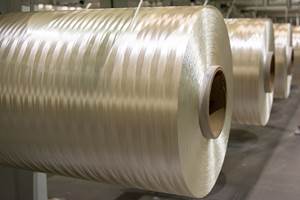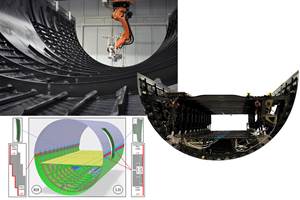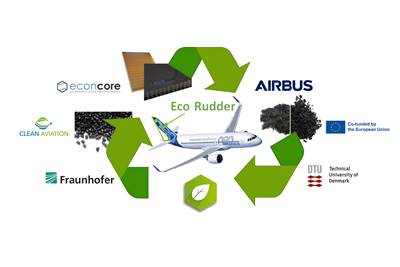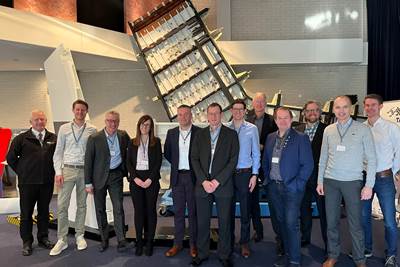GKN Aerospace opens new Netherlands-based Global Technology Center
The Hoogeveen facility provides an R&D space focused on lightweight thermoplastic composites and advanced electrical cabling systems for next-gen aircraft.
On May 8, GKN Aerospace (Redditch, U.K.) opened a Global Technology Center (GTC) in Hoogeveen, the Netherlands, to provide an innovation ecosystem for composites research and accelerate the development of the latest sustainable aviation technologies in the region as part of an €80 million investment package from GKN Aerospace. The center focuses on lightweight thermoplastic composites and advanced electrical cabling systems for next-generation aircraft.
The launch was a significant affair for GKN Aerospace, the local region and the country. Attendees included Karel Loohuis, mayor of Hoogeveen; Michiel Sweers, deputy director-general for enterprise and innovation, and director of the Innovation and Knowledge Department at the Ministry of Economic Affairs and Climate Policy; David Paja, CEO of GKN Aerospace; and John Pritchard, president civil airframe GKN Aerospace, who presented during the opening ceremony.
Arnt Offringa, director of the newly opened GKN Fokker Global Technology Center, hosted the ceremony. He articulated, “The GKN Fokker GTC’s thermoplastics research programs aim to develop novel thermoplastic materials and processes for scalable, affordable, high-volume production for next-generation single-aisle aircraft. Advanced lightweight thermoplastic composites offer an overall weight saving of at least 10% compared to traditional aircraft materials, are more efficient to produce than thermoset structures and have high fire safety and recyclability. GKN Aerospace’s broader sustainability strategy is to further lightweight aerospace structures at an acceptable cost and performance, and thermoplastics are an enabler for multiple sustainability targets throughout the aerospace value chain and provide the massive potential for high build rate environments with a recycling agenda for fully reprocessed composite parts, including polymer elements. These characteristics make them a cheaper, more sustainable solution for aircraft structural components, which is why we invest in their future.”
GKN Fokker and Mikrosam (Prilep, Macedonia) recently produced the Multifunctional Fuselage Demonstrator’s (MFFD) floor beams, which take advantage of automated fiber placement (AFP), and 6-meter spars for thermoplastic composite rudders, elevators, and tails which feature out-of-autoclave (OOA) consolidation at the Hoogeveen GTC. The MFFD is paving the way for next-generation airframes made using thermoplastic composites instead of primarily thermoset composites — mostly carbon fiber-reinforced epoxy — used for aerostructures today.
The Hoogeveen GTC will also host an extensive R&D electrification program in collaboration with the GKN Fokker locations in Hoogerheide and Papendrecht. The electrification program researches and develops advanced cabling and distribution systems to support the increased electrical power required for electric aircraft and hydrogen fuel cell systems.
President of civil airframe GKN Aerospace John Pritchard also spoke at the Hoogeveen launch event, highlighting, “GKN Aerospace is currently leading sustainable aviation projects in multiple countries, from its GTCs in Bristol, U.K., Trollhättan, Sweden, and Fort Worth, U.S. Each center has its own area of expertise and ecosystems, including universities, knowledge institutes and partners. Cooperation between companies and between regions is crucial for the aviation industry to become emission-free.”
“The Hoogeveen GTC reflects our continued commitment to the Netherlands,” he continued. “The center will help accelerate the adoption of lightweight, cost-effective thermoplastic aerostructures, crucial for the sustainable future of aviation. By ensuring that the Netherlands can develop these technologies and produce them throughout the Dutch supply chain, we maintain our leading position and underline our commitment to sustainability.”
Related Content
Bio-based acrylonitrile for carbon fiber manufacture
The quest for a sustainable source of acrylonitrile for carbon fiber manufacture has made the leap from the lab to the market.
Read MorePlant tour: Teijin Carbon America Inc., Greenwood, S.C., U.S.
In 2018, Teijin broke ground on a facility that is reportedly the largest capacity carbon fiber line currently in existence. The line has been fully functional for nearly two years and has plenty of room for expansion.
Read MoreNatural fiber composites: Growing to fit sustainability needs
Led by global and industry-wide sustainability goals, commercial interest in flax and hemp fiber-reinforced composites grows into higher-performance, higher-volume applications.
Read MoreManufacturing the MFFD thermoplastic composite fuselage
Demonstrator’s upper, lower shells and assembly prove materials and new processes for lighter, cheaper and more sustainable high-rate future aircraft.
Read MoreRead Next
EcoRudder project to develop thermoplastic composite aircraft rudder
Airbus, EconCore, Fraunhofer and the Technical University of Denmark will produce a potentially recyclable rudder from thermoplastic honeycomb sandwich composites.
Read MoreSolvay, GKN Aerospace renew collaboration agreement
Both companies aim to expand the use of thermoplastic composite materials on high-rate aerospace structures.
Read MorePlant tour: Daher Shap’in TechCenter and composites production plant, Saint-Aignan-de-Grandlieu, France
Co-located R&D and production advance OOA thermosets, thermoplastics, welding, recycling and digital technologies for faster processing and certification of lighter, more sustainable composites.
Read More
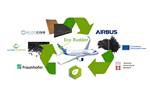
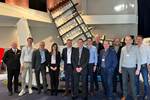

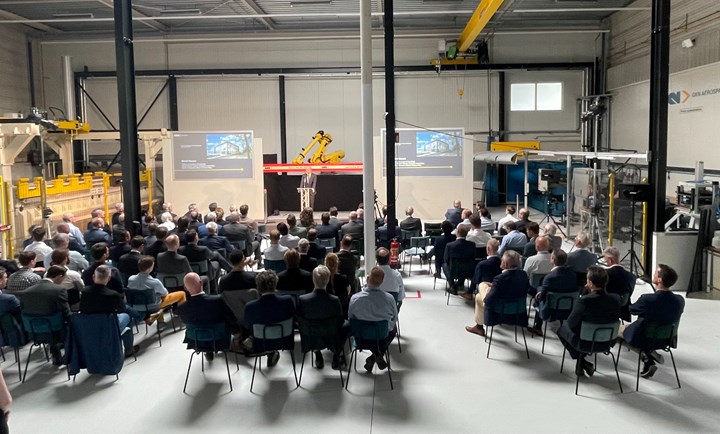



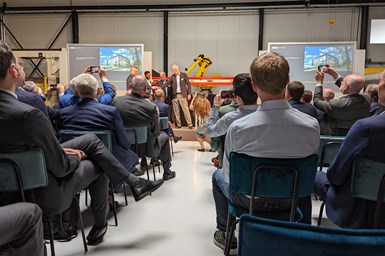











.jpg;maxWidth=300;quality=90)
